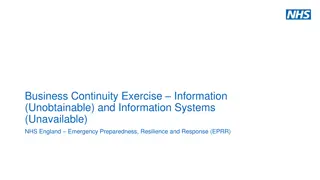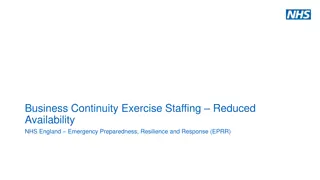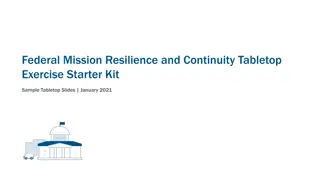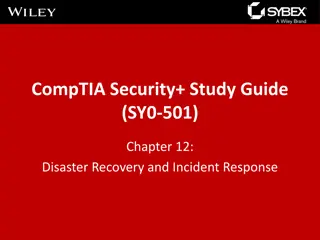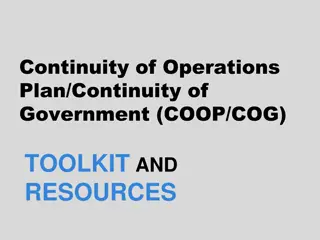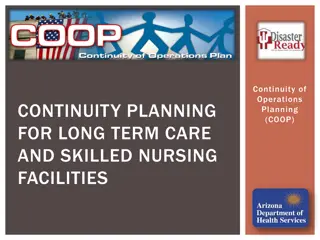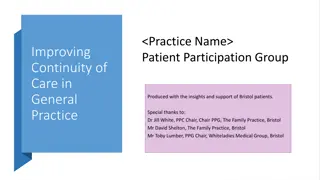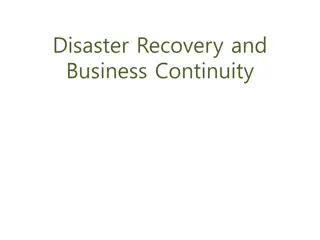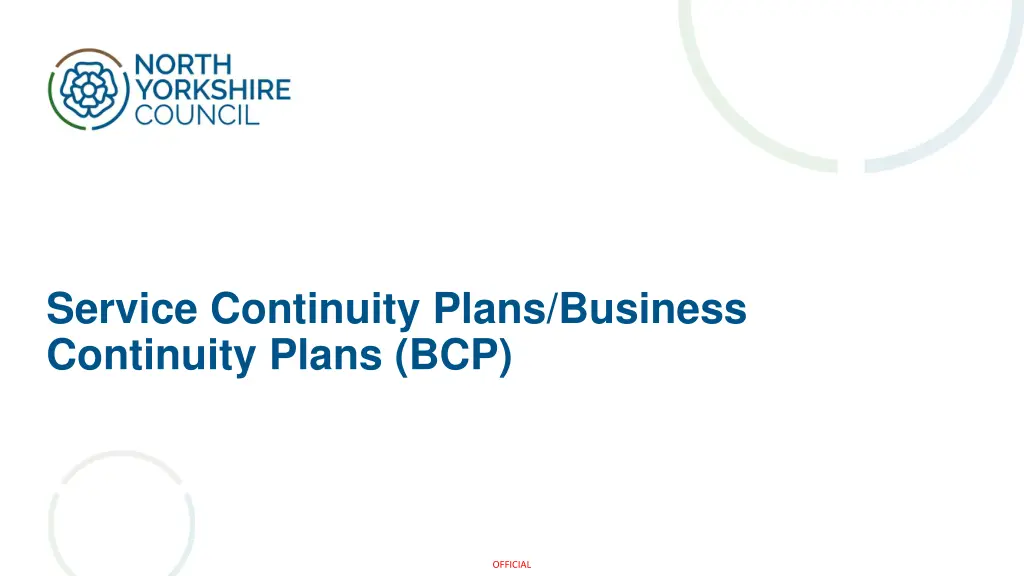
Essential Business Continuity Planning for Resilience Against Various Challenges
Learn about Service Continuity Plans and Business Continuity Plans (BCP) to prepare for challenges like COVID-19, flu, severe weather events, power supply instability, and more. Understand the importance of BCPs in addressing different risks and ensuring continuity in operations during emergencies.
Download Presentation

Please find below an Image/Link to download the presentation.
The content on the website is provided AS IS for your information and personal use only. It may not be sold, licensed, or shared on other websites without obtaining consent from the author. If you encounter any issues during the download, it is possible that the publisher has removed the file from their server.
You are allowed to download the files provided on this website for personal or commercial use, subject to the condition that they are used lawfully. All files are the property of their respective owners.
The content on the website is provided AS IS for your information and personal use only. It may not be sold, licensed, or shared on other websites without obtaining consent from the author.
E N D
Presentation Transcript
Service Continuity Plans/Business Continuity Plans (BCP) OFFICIAL
Setting the scene Multiple challenges, including: COVID-19 Flu Other respiratory/infectious disease (emerging disease outbreaks, norovirus etc.) Severe weather events Systems pressures including staffing Power supply instability Cost of living crisis National plans, such as the National Fuel Plan, have a high threshold so often response and recovery is undertaken at a local level. OFFICIAL
Service Continuity Plans Also known as BCPs Different risks require different responses based on the scope and duration of the incident. Your BCP should detail the information you need to answer a range of questions in the context of the predicted duration of the event, for example Loss of power: Have you checked your fuse box? Do you know where it is? Have you spoken to the energy supplier to understand the predicted duration of the incident? Will power doors and locks be affected? Will this result in more staff being required? Do your phones connect to the mains electricity supply? What contact number will be used in the event of an emergency situation? Will call bells/doorbells/assistive technology still work? What is the impact on lighting? Will you lose computer systems? What personal equipment will be affected and what needs to be done differently? Will this impact on catering arrangements and how? What s the weather forecast? Will this lead to increased risks? Will the loss of power impact on my usual communication methods - WhatsApp? OFFICIAL
Loss of water: Do you know where the stop cock is located? Have you spoken to the water supplier to understand the duration of the incident? Are they providing a supply of bottled water or delivering water to a location where you can access some? Will this impact on food preparation, immediately and the next meal service? Can you access local suppliers? Can you make drinks? Are there alternatives to maintain fluid intake? What is the impact on personal care? What is the impact on cleaning? What s the weather forecast? Will this bring additional risks? OFFICIAL
Loss of Gas Have you contacted the gas supplier to understand the predicted duration of the incident? Will this impact on heating? Will this impact on meal pre-preparation? What alternatives can be put in place? What will be impact of using temporary heaters, both personal safety and pressure on electrical supply? OFFICIAL
Loss of premises: Do you know how long you are relocating for? Will the venue you were locating to be affected by the same issues? Do you need to consider a venue if it's only your premises affected, which could be local and an alternative venue where the event impacts a wider area? How will you get there? Will people use their own transport? What types of transport will you need and how will you source it - minibus, wheelchair accessible transport, ambulance transport? Will additional staff be required to support evacuation? Will you need to deploy staff to multiple venues and can you support this activity? Are any staff impacted by the incident resulting in them not being able to work? What personal belongings are needed, clothes, continence products, etc.? What equipment do you need? What will you need for an evacuation which lasts multiple days? Don t forget essential kitchen equipment! Will any medication be impacted, safety, storage, administration? Who do you need to tell, District Nurse, independent domiciliary care providers. care provider, relatives? - Do you have their information readily available? OFFICIAL
Loss of staff: Is it travel related, illness or a significant incident which is impacting on service delivery as well? Can rotas be changed to help with transport options? Are you at minimum viable staffing levels and delivering essential support only? Do you have up to date contact details for all staff? Are WhatsApp/communication groups set up and have details been reviewed recently? What is the impact on others of changes to service delivery, e.g., will the person require additional support at home? Do you need to escalate for awareness or support? OFFICIAL
Loss of IT Do you know the predicted duration of the incident and the scope? What essential information do you have access to? What information is available in paper form? Are you part of a company where staff in other settings may be able to access information and deliver it to you? Are your mobile devices affected? If no, which are still available? What information can you still access via mobile devices? Are permissions to use personal devices to access information in place? What is needed to ensure compliance with GDPR? Can you access information via another source? What is this source? Is it trusted? OFFICIAL
Next steps Updating BCPs to cover anything that may be missing or where more information can now be added. Embed BCPs with staff teams Promote utility companies Vulnerable/Priority Customers lists, will people need support to sign up? Do you need to consider alternative equipment to use? Wind up torches, head torches to support with medication administration, radios, etc? HAS Severe Weather Events Management Plan replacing Heatwave Plan and Cold Weather Plan and should support activity in relation to communicating issues and escalating support, where appropriate the need for Revise Plan Review Do Check OFFICIAL
Dont forget: Plan for concurrent incidents Don t assume anything. Advice can be sought from a range of sources, e.g., North Yorkshire Fire & Rescue Service, Infection Prevention & Control Team, etc. Keep thinking what if? Be mindful of unintended consequences of situations and decision making Make sure any tools, procedures or documentation you refer to is easily accessible to staff and they know where it is. We will review lessons learned from incidents, share findings and continue to improve practice You have a breadth of knowledge and have evidenced your practice throughout the pandemic. Reflect on what you have learned and ensure you build that into your BCP OFFICIAL
Useful Resources When an incident occurs which does not trigger a multi-agency major incident response utility companies use their priority customers information to prioritise a response and not information from other agencies. Links to the main utility providers are: Services Directory | Northern Powergrid Yorkshire Water - Priority services register Priority customers | Northern Gas Networks Please ensure you have registered your service as a priority service/customer and make reference to this in your Business Continuity Plans Further advice and guidance Business Continuity Planning - Care Provider Alliance Health and social care services (hse.gov.uk) Cold weather plan for England - GOV.UK (www.gov.uk) Heatwave Plan for England - GOV.UK (www.gov.uk) NHS England Business continuity OFFICIAL



